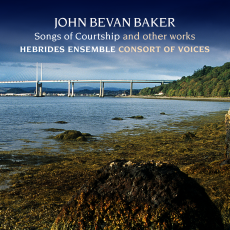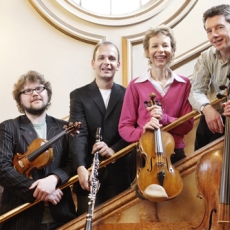John Bevan Baker - Hebrides Ensemble - The Scotsman
Some composers blaze trails; others go along behind clearing the path and trying to encourage that direction - I'm one of those composers." These words, by John Bevan Baker, sum up the modest and honest integrity of a composer who lived a quiet life in Scotland up to his death 12 years ago. And were it not for an enterprising new CD, out this month on Linn Records and dedicated entirely to his music, the likelihood is that Bevan Baker's sizeable artistic legacy could easily have remained buried in undeserved obscurity.
That's certainly the view of William Conway, the composer's son-in-law, who has spent much of his own distinguished musical career finding opportunities to perform a canon of work he believes is of huge interest in its accessibility to amateurs and professionals alike, and in the sincerity and skill of its composition.
Conway is the artistic director of the Hebrides Ensemble, currently Scotland's most exciting mixed chamber ensemble specialising in contemporary music, and together with the Edinburgh-based Consort of Voices has engineered a recording project that is far more than simply a sentimental tribute to his father of his wife (the violinist Sarah Bevan Baker).
On the contrary, every one of the works featured on this new disc - an illuminating combination of choral settings and instrumental chamber music - reflects a sharp and refined musical mind, something far more deep-rooted than its self-effacing warmth and prominent lyrical expression would suggest.
What strikes you most about these works, however, is that just about all of them date from the last 15 years of Bevan Baker's life. That's something that has often puzzled Conway. "I first met John in 1980, when he wrote Triptych for me to perform at a recital I was giving at the Black Isle Arts Society," he says. Conway performs Triptych - its plaintive charm and energy is seductive - on the new CD with pianist Graeme McNaught. "It made me wonder why John had written so little in the years up to that."
As the connection deepened through marriage into the family, Conway kept urging his father-in-law to write more. "He was a composer who liked to write exclusively for those around him. So, many of those late works were aimed specifically at performances by the Black Isle Singers, which he formed and directed himself, or by many of our own musical friends whom we invited up to Fortrose."
The result was a late flurry of creativity, which included a one-act opera, The Seer - tragically never performed during the composer's lifetime.
Indeed, one of the most impressive works on this recording is Eclogue, which Bevan Baker had all but completed when he died. "It was sitting on the piano the day he died," Conway recalls. "It was basically finished, but he hadn't quite tied up the last few bars. We got the composer Nigel Osborne [Reid Professor of Music at Edinburgh University] to tie up the loose ends, which he did, and the work was finally performed."
The sheer delicacy of its scoring for mixed quintet, and the effortless melodies that flow from its mildly astringent harmonies are certainly not that of a waning mind. What they do represent are a style of composition that exists more for the beauty of its genuine conception and purpose than anything trailblazing or pushing the bounds.
In the other representative works, stylistic borrowings are openly evident. "John particularly liked Bartók and Lutoslawski, and he didn't hide those influences" says Conway. There is no escaping these, either in earlier works such as the Piano Suite - spiced with the same cellular rotating motifs favoured by Bevan Baker's direct contemporary, the Scots-based composer Kenneth Leighton - or in the characterful Spring for solo violin, which was written as a birthday present to his daughter, Sarah, Conway's wife.
Perhaps, too, it is the Romantically-fired Impressionist strains of A Song for Kate - another family trinket, written for his first granddaughter with echoes of Ravel - or even the Howells-like lushness of the two substantial choral works on the disc - the deeply evocative Songs of Courtship and ingeniously-textured Rorate Coeli Desuper - that have led many to dismiss Bevan Baker's music as less than fashionable for its time.
According to Sir Peter Maxwell Davies, writing in the Linn sleeve note "Bevan Baker's creative peak came at a time when composers at the borders of tonality and beyond, writing for specialist professional performers, were perceived as the only trail-blazers, and received most of the critical attention. This is beautifully crafted, transparently honest music, of great warmth and melodic fecundity." But is that hardly surprising? Bevan Baker's early career was that of someone definitely going somewhere, and with a keen mind of his own.
Born in Middlesex in 1926 to a family of top academics, his pacifist leanings led to war service as a miner in Northumbria (one of the so-called Bevin Boys), before entering the Royal College of Music (RCM) to study composition with no less a figure than Ralph Vaughan Williams.
On leaving the RCM, he took up the prestigious post of assistant organist of Westminster Abbey, the first rung on a journey that could have easily have seen him rise swiftly up the music establishment ladder. But it wasn't for him.
The next move was to Aberdeen, where he combined the unusual post of City Carilloneur (playing the keyboard-operated bells of St Nicholas Church) with teaching duties at Robert Gordon's College. There he met and married his wife June, with whom he had five children. After a spell of teaching in Glasgow, he finally settled in Fortrose, where he died in 1994.
Bevan Baker would have been 80 this year, so Linn's tribute recording has a special significance. It is also a potent reminder that, had he lived longer, this late burst of energy could easily have produced so much more music deserving of wider performance than to the close-knit community he habitually wrote it for.
Look further into his music - currently being fully catalogued by the family - and you find musicals, choral works and even opera, which are so attractive and accessible, they would be ideal for performance by amateur and professional groups alike. That is the charm of Bevan Baker's music. Like his admirer, Maxwell Davies, he combined creative ingenuity with a common touch. That's maybe not a fashionable attribute to have these days, but it's one to be proud of.

